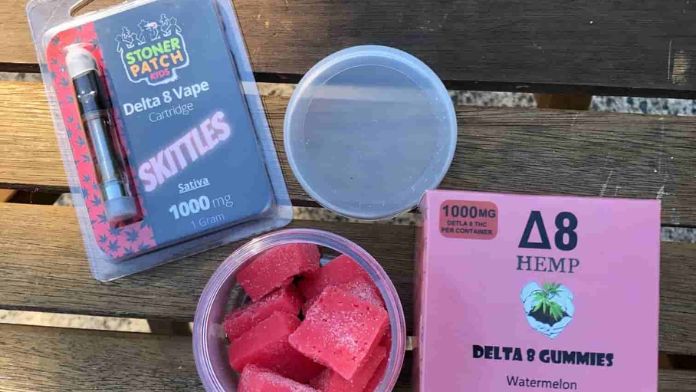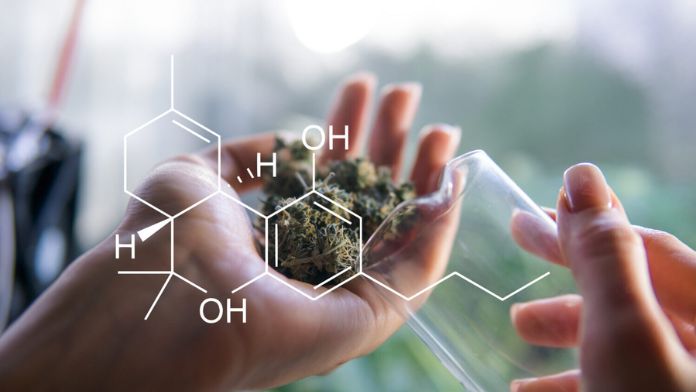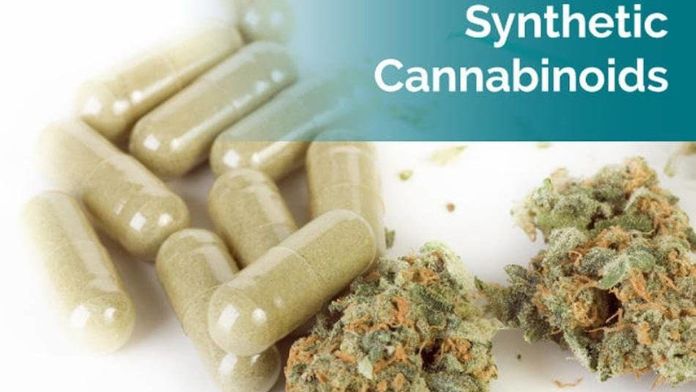The comparison between Delta 8 and K2 in the ever-changing cannabinoids and synthetic substances industry has sparked curiosity and concerns among users, necessitating informed usage decisions.
What Is Delta 8
Delta 8, a lesser-known cousin of Delta 9 THC, is a naturally occurring cannabinoid found in trace amounts in cannabis plants. It has gained popularity for its mild psychoactive effects, distinct from the more potent Delta 9 THC. Derived from hemp, Delta 8 has legal status in many regions, making it accessible for various applications.
Delta 8 refers to delta-8-tetrahydrocannabinol, a minor cannabinoid found in the cannabis plant. Unlike its more well-known cousin, delta-9-THC, Delta 8 is reported to offer a milder psychoactive experience with reduced anxiety and paranoia. It interacts with the endocannabinoid system, producing effects that some users describe as a balanced, uplifting high. Delta 8 has gained popularity for its potential therapeutic benefits, including pain relief and appetite stimulation while maintaining legal status in some regions where delta-9-THC remains restricted. It’s commonly derived from hemp through various extraction methods, making it a legal and accessible alternative for those seeking a unique cannabis experience.
Chemical Composition Comparison
Analyzing the molecular structures of Delta 8 and K2 reveals notable differences. Delta 8 interacts with the endocannabinoid system, producing mild euphoria and relaxation. On the other hand, K2 contains synthetic chemicals that can lead to severe and unpredictable side effects, including hallucinations and cardiac issues.
Chemical Composition Comparison involves analyzing and contrasting the elemental makeup of different substances to discern similarities or differences. This analytical process is crucial in various scientific fields, such as chemistry and materials science, where understanding the precise composition of substances is fundamental. Researchers employ sophisticated techniques to identify and quantify elements in a sample, enabling them to compare different materials or compounds.
This method is instrumental in quality control, research and development, and ensuring compliance with industry standards. Through Chemical Composition Comparison, scientists unravel the intricacies of matter, contributing to advancements in diverse fields, from manufacturing to environmental science.
Legality: Delta 8 vs. K2

Legal considerations play a significant role in the accessibility and usage of Delta 8 and K2. While Delta 8 enjoys legal status in many areas due to its natural origin, K2 faces many legal challenges, often leading to bans and restrictions.
Navigating the legal landscape of Delta 8 and K2 can be like treading a complex legal web. Delta 8, a THC compound with mildly psychoactive effects, exists in a grey area, subject to evolving regulations. Its legality often hinges on the source and extraction methods.
On the other hand, K2, commonly associated with synthetic cannabinoids, faces a different legal scenario. Many formulations of K2 have been classified as illegal substances due to their unpredictable and potentially harmful effects. Understanding the legal distinctions between Delta 8 and K2 is crucial for individuals, businesses, and policymakers alike as they grapple with the nuanced regulatory frameworks surrounding these substances.
Safety Concerns
In contrast, K2 has gained notoriety for its severe health risks, including seizures, kidney damage, and even death. The synthetic nature of K2 makes its effects unpredictable and dangerous.
Safety concerns refer to potential risks, hazards, or issues that may compromise the well-being and security of individuals, environments, or systems. These apprehensions encompass a broad spectrum, ranging from workplace physical safety to public health and product reliability. Identifying and addressing safety concerns is crucial for preventing accidents, injuries, or adverse consequences. It involves a proactive approach to risk assessment, implementation of safety measures, and continuous monitoring to ensure a secure and protected environment.
In various contexts, such as industries, transportation, and everyday life, acknowledging and prioritizing safety concerns is paramount for fostering a culture of well-being and minimizing potential threats. Effectively managing safety concerns requires collaboration, adherence to regulations, and a commitment to creating environments where the welfare of individuals is a top priority.
Potential Interactions with Medications
Delta 8’s interactions with pharmaceuticals are relatively mild, and users can cautiously incorporate it into their wellness routines. Conversely, K2’s synthetic compounds can have unpredictable interactions with prescribed medications, leading to adverse effects. Potential Interactions with Medications refers to the comprehensive evaluation of how a particular substance, often a drug or supplement, may influence the effectiveness or safety of other medications when used simultaneously.
This analysis is crucial in healthcare to prevent adverse reactions or unexpected consequences that may arise from the combination of different pharmaceutical agents. Healthcare professionals meticulously assess potential interactions to ensure optimal patient outcomes and minimize risks. By addressing potential interactions, healthcare providers can make informed decisions, personalize treatment plans, and prioritize patient well-being in the intricate web of medical interventions.
DIFFERENCES BETWEEN CBD, DELTA-9 THC, AND DELTA-8 THC

Now that we have covered all the specifics of delta-9 THC, delta-8 THC, and CBD, let’s briefly review their differences.
Delta-9 THC produces the most intense high or feeling of intoxication. Similarly, delta-8 THC also has a high, though it is less potent. CBD does not make a high when consumed. Both delta-8 and delta-9 THC can help stimulate appetite, while CBD taken in isolation may decrease appetite.
A consumer may experience adverse effects when consuming delta-9 THC, such as paranoia or anxiety due to the potent high. However, these negative side effects are less likely to occur when consuming delta-8 THC due to its less powerful high. CBD has anxiolytic properties that decrease the likelihood of you experiencing any adverse effects like those mentioned above.
Delta-8 and delta-9 THC will show up on a drug test, but CBD isolate will not. It’s important to note that if you consume broad-spectrum or full-spectrum CBD, it may show up on a drug test because it contains all the other cannabinoids.
Finally, the legality of each of these cannabinoids differs. CBD and delta-8 THC are technically legal under the Farm Bill. However, there is some grey area surrounding delta-8 THC in particular. Some states have outlawed delta-8 THC due to the unregulated nature of the market in the name of consumer safety. Delta-9 THC is legal in states that have a recreational or medical cannabis program for adults or patients registered with the state.
Delta-8 is Legal, But It’s Not By Design
Many people will claim that lawmakers did not intend to legalize psychoactive cannabinoids when the 2018 Farm Bill became law. That may be true, and the general focus was on legalizing industrial hemp crops for various practical uses, like using their fibers to produce fabrics, paper, and more. The bill also addressed a solid urge to legalize CBD, which had previously been gaining traction in many states as a treatment for intractable epilepsy.
Still, the bill does seem to include hemp-derived Delta-8-THC in its legal definition, which only prohibits a “delta-9 tetrahydrocannabinol concentration of not more than 0.3 per cent on a dry weight basis.”
The original bill could have just prohibited tetrahydrocannabinol in general, but lawmakers instead chose to deny only Delta-9-THC narrowly.
A clause in Section 12619b of the 2018 Farm Bill explicitly addresses tetrahydrocannabinol in hemp material. This clause states that all tetrahydrocannabinol in hemp is specifically exempt from scheduling within the Controlled Substances Act, save for Delta-9-THC in amounts more significant than 0.3% by dry weight. Otherwise, lawmakers have yet to clarify their proper position on Delta-8-THC products.
Delta-8 Is Not A Synthetic Cannabinoid
Delta-8-THC is a cannabinoid, and it is also an isomer of CBD. (We’ll touch more on is delta 8 like k2 reddit below.) Delta-8 naturally occurs in hemp material but in minimal concentrations. Most of the Delta-8-THC products on the market today contain Delta-8 that was “synthesized” from CBD that was naturally derived from hemp material.
Some interpretations of the federal ruling on hemp and Delta-8 suggest that most Delta-8-THC products are “synthetic” because of the way they are made from CBD. This suggestion completely disregards the 2018 Farm Bill that legalized hemp material using the following definition:
“the plant Cannabis sativa L. and any part of that plant, including the seeds thereof and all derivatives, extracts, cannabinoids, isomers, acids, salts, and salts of isomers, whether growing or not, with a delta-9 tetrahydrocannabinol concentration of not more than 0.3 percent on a dry weight basis.” Including “all derivatives” helps to clear up any confusion about Delta-8-THC’s legal status.
Delta-8 Is Not A Synthetic Cannabinoid

Delta-8-THC is a cannabinoid, and it is also an isomer of CBD. (We’ll touch more on is delta-8 dangerous below.) Delta-8 naturally occurs in hemp material but in minimal concentrations. Most of the Delta-8-THC products on the market today contain Delta-8 that was “synthesized” from CBD that was naturally derived from hemp material.
Some interpretations of the federal ruling on hemp and Delta-8 suggest that most Delta-8-THC products are “synthetic” because of the way they are made from CBD. This suggestion completely disregards the 2018 Farm Bill that legalized hemp material using the following definition:
“the plant Cannabis sativa L. and any part of that plant, including the seeds thereof and all derivatives, extracts, cannabinoids, isomers, acids, salts, and salts of isomers, whether growing or not, with a delta-9 tetrahydrocannabinol concentration of not more than 0.3 percent on a dry weight basis.” Including “all derivatives” helps to clear up any confusion about Delta-8-THC’s legal status.
K2 Risks And Consequences
K2, in contrast, poses significant risks, both legally and health-wise. Emergency cases related to K2 use have increased, prompting authorities to take strict measures to curb its distribution. The unpredictable nature of synthetic compounds in K2 makes it a problematic choice for recreational use.
K2 Risks and Consequences” refers to assessing and analyzing potential dangers and outcomes associated with using or implementing K2, a synthetic cannabinoid. This keyword is significant in public health, as K2 poses various risks due to its unpredictable and often harmful effects on individuals. The term encapsulates exploring the potential physical, mental, and social consequences of K2 consumption. It encompasses concerns related to adverse health effects, legal implications, and societal repercussions associated with the use of this synthetic substance.
Understanding the “K2 Risks and Consequences” is crucial for policymakers, healthcare professionals, and the community at large, as it aids in devising effective strategies to mitigate harm and address the multifaceted challenges posed by synthetic cannabinoids like K2.
Conclusion
In conclusion, while Delta 8 and K2 may share some aspects of the cannabinoid world, their differences are stark. Delta 8, with its natural origin and milder effects, stands in contrast to the synthetic and hazardous nature of K2. Users must weigh the risks and benefits, opting for the safer and more regulated option in Delta 8.
FAQ
What Is Delta 8 Equivalent To?
The consensus is that delta 8 is about half as substantial as the equivalent dose of delta nine, at least regarding the psychoactive effects. Some other effects are on par with delta nine or stronger — for example, delta 8 has a notable calming action.
What Kind Of High Is Delta 8?
Delta-8 produces a fuzzy, euphoric high that’s said to be similar to that of marijuana but milder. Some people also use it to ease symptoms of conditions like stress, depression, or chronic pain. But there’s little research to confirm that it’s effective for those purposes.
What Is Stronger Than Delta 8?
THC-O and delta-8 are both hemp-derived cannabinoids that deliver psychoactive effects. THC-O is roughly 6-8 times as potent as delta 8, but this also depends on how large of a dosage you take.
What Is The Alternative To Delta 8?
Delta-9 is weaker than Delta-8 and is one of the other naturally occurring cannabinoids in hemp and marijuana. However, it is produced in larger quantities through the isomerization process of CBD in a similar fashion to Delta-8.
Is Delta 8 Safe To Smoke?
The most significant risk of delta-8 THC is that it’s not regulated, which means that safety, purity, and strength can’t be guaranteed. Until more research is done and stricter regulations are passed, it’s safer to use regulated cannabis products instead of over-the-counter delta-8 products.

